- Home
- Daniel Woodrell
The Death of Sweet Mister
The Death of Sweet Mister Read online
Begin Reading
Table of Contents
Reading Group Guide
Copyright Page
In accordance with the U.S. Copyright Act of 1976, the scanning, uploading, and electronic sharing of any part of this book without the permission of the publisher constitute unlawful piracy and theft of the author’s intellectual property. If you would like to use material from the book (other than for review purposes), prior written permission must be obtained by contacting the publisher at [email protected]. Thank you for your support of the author’s rights.
In memory of Billy M. and that
Second Street kitchen of swag
We know many things about those we love—things we nevertheless refuse to believe.
—ELIAS CANETTI
Mother is the best bet and don’t let Satan draw you too fast.
—DUTCH SCHULTZ, on his deathbed
FOREWORD
“You wake up in this here world, my sweet
li’l mister, you got to wake up tough.”
Most of us remember parts of ourselves that didn’t survive adolescence. At some point, to make our way in the world, we did as the Good Book suggested and put aside childish things. And so it is in The Death of Sweet Mister, where the death in question is not physical. In some ways, though, it’s worse. It’s the death of the “sweet,” the death of the soul, the end of anything approximating childhood or innocence.
Sweet Mister’s real name is Morris “Shug” Akins. His father may or may not be Red Akins, a career criminal given to fits of cyclonic rage. His mother is the beautiful alcoholic Glenda, a woman far too sexy for rural Missouri, maybe far too sexy for the world at large, a woman who “could make ‘Hello, there’ sound so sinful you’d run off and wash your ears after hearing it, then probably come back to hear it again.”
Shug is not sexy. Shug is overweight and socially awkward among his peers. He is thirteen and filled with bottled-up screams from years of Red’s abuse. He’s so lonely that he breaks your heart on nearly every page. The novel is concerned with his coming-of-age one summer in the late ’60s in the Ozarks. Coming-of-age in the Ozarks was probably never an easy thing, but these aren’t just the Ozarks, they are Daniel Woodrell’s Ozarks, and that is pitiless terrain. Few writers have captured lives laid to waste by generational poverty with the precision of Woodrell. His body of work is already canonical in the sense that you can’t imagine American literature in the last twenty years without him. And until we hear otherwise, the Ozarks are his and his alone, as indelibly stamped by his spare and savage poetry as Faulkner’s Mississippi or William Kennedy’s Albany. In Woodrell’s world the violent are the rule, not the exception, and what they bear away from this world is kindness and empathy and the uncaged heart.
When the novel begins, Shug still possesses those things. He identifies with the victims and the vanquished. “A hurt-voiced dog was chained up lonely or locked out not too far away and did bay and bay, baying so’s I could understand, baying the way I felt.” Later, he will come upon robins “so lost in gorging on beached worms that they sat there feasting yet when I walked up, so I took the worms’ side and kicked at them…”
Red, however, knows nothing of empathy. He berates and belittles Shug without end. He uses and discards Glenda as he sees fit; if she complains, he beats her with “fists, which could flurry so swift.” He uses Shug too, enlisting him more and more as an accomplice on the pharmaceutical robberies he and his friend Basil get up to. These involve second-story work mostly, and it’s fitting that during the summer his life will change irrevocably, Shug discovers the height gives him a new vantage point where the “world looked the same as I always saw, only I could see more of it at a time.”
To see more of the world is a necessary step in anyone’s passage from innocence to experience, but what Shug gets to see involves bloodletting, cruelty, and a particularly toxic form of Oedipal bewilderment.
When Glenda takes up with a Thunderbird-driving, soft-hearted cook named Jimmy Vin, we can see the carnage coming from a mile off, but that hardly tempers our fascination. In all of his novels, but most particularly in this one and in Winter’s Bone, Woodrell is after so much more than the paltry “country noirist” label that’s been attached to him. He is writing high tragedy set among low people. His novels are about sensational things—murder, tribalism, incest, and the idiocy of regeneration through violence as a concept—but he never renders them sensationally. Instead, he writes with such poetic clarity his prose seems to have been scrubbed in a cold stream.
When all the dead have been buried (usually in unmarked graves) and all the scores have been settled (until the next cycle of revenge, anyway), and Shug’s “bottle where I hid my lifelong screams” has shattered, we have completed our journey through one of the literary masterworks of the last quarter century. I don’t know anyone who’s read this novel who didn’t feel seized and then altered by it. Because what dies in Sweet Mister is what we pray has not died in us, but what we fear, in our more honest hours, vanished years ago.
—Dennis Lehane
RED MADE me get out and paint the truck another color once we’d crossed the state line. His voice to me seemed always to have those worms in it that eat you once you’re dead and still. His voice always wanted to introduce me to them waiting worms. He had a variety of ugly tones to speak in and used them all at me on most days. He whipped off a skinny country rock road and dove the truck down a slope of plain young weeds towards a creek that slobbered and swung under some trees for shade and parked. Glenda, which was my mom, rolled between him and me in the cab, smelling of her “tea,” as she called her rum and colas, and last night’s sweat and this morning’s perfume, her head pretty often soft on my shoulder and her breaths going up my nose. The weather had looped around to where it was good again, too good to last long, and had prompted blossoms to unclench and wild flowers to pose tall and prissy amongst the weeds, plus it brought forth song birds and bumble bees and all the likewise shit of spring. The tree patch we’d swung under blocked the eyesight of any decent folks who might pass along on that rock road and gain a curiosity about us if we were available to be seen. Our ways often required us to not be seen. Red had pulled something fairly wrong in a white truck down in Arkansas and wished to be driving a blue one back in Missouri.
“So hop your fat ass out, boy, and start tapin’ those newspapers over the windows. I’ve showed you how before.”
“And I learned it when you showed it.”
“Well? So set your flab to wigglin’ and get out there and go at it, boy.”
Glenda listened to him with her eyes shut and her head on my shoulder. Her pale right hand, which was elegant and fast, snapped like a clothespin onto the pudge at my equator and pinched hard, pinched my flab extra hard, this pain reminding me silently to stand up tough to her husband.
She said, “Don’t belittle him so that way.”
He said, “Which way?”
“Shuggie’s not fat.”
“The hell he ain’t.”
Glenda sat upright and flubbed her lips, so gorgeous even with a sleepy face and hardly any makeup. She had hair the color they call raven, and it had been back-combed and puffed up and out and sprayed to a certain round firmness. This was her fancy dolled-up style of hair instead of her usual, which was just drooping loose. Glenda never would get too plain or too heavy. Her eyes were of that awful blue blueness that generally attaches to things seen at a distance, far away, far out yonder on the water, or way way up.
“Maybe,” she said, “portly, but not…”
“Aw, bull-shit!” Red shoved his door open and it squawked. “Your boy ain’t nothin’ but fat.” He slammed the door, then ducked
his head in through the window. He looked at her and said, “What in hell are you smilin’ about?”
“If only to avoid wrinkle lines,” she said, “I have chosen to appear happy.” She pinched me again and winked my way. Red turned and went to the truck bed and started tossing out tape and paint and papers. “Is there any tea left in my thermos, Shug?”
“Yeah. I mixed it fresh in the parking lot back at that café.”
“Hand it here, baby. I hear a thirst stomping towards me, think I best meet it halfway.”
I did hand that tea to her, then I did get out and grab up the papers and the tape Red had tossed. I took the papers and spread them over the glass windshield and side windows, then used my teeth to pull the tape loose. The tape rolled out with a sound like sneezes.
Red stood paces from me near the biggest close bush and pissed piss-lashes at it while singing one of those old songs that once in a while showed up on the radio even that year, which was way after them tunes had got stale. The song was of the “Ready Teddy” or “Tutti Frutti” or “Good Golly, Miss Molly” type of olden rhyming rock’n roll. Olden rhyming tunes to which he was yet and forever dedicated, I’d say. I could not say what had got him to singing or why. This trip to Hot Springs was one of those so many many times when him and Glenda were supposed to patch things up between them and get on the level as married folks again, which they never did do.
I’d become thirteen that year and Red was near only the height I was at that age, but a man. He had the muscles of a man and all those prowling hungers and meannesses. You might have taken him to be a wrestler or a Viking or such from the muscles he carried. His hair was the color you’d expect, but a red of so odd a red that it gave a slight comic-book or circus angle to him. You could see skin shine between the hairs of his head, and the thin amount of hairs left were slicked into a bump, a thin bump of hair combed aloft slick like rockin’ greasers of the prior decade, to which he was loyal as to style.
He lashed that bush with four or five cups of coffee he’d drunk at breakfast and kept singing. The song was along the lines of “Lawdy Lawdy Clawdy” or some such. He’d sang it before within my hearing but I never paid attention.
Nice and quick I had the driver’s window and the windshield covered by newsprint and all taped down by masking tape. This made a darkness in the cab and that got Glenda to slide out, her yellow skirt slipping high on her legs, carrying her silver thermos. She sat on a thick patch of green weeds in the morning sun with her skirt spread ladylike and watched me. She watched me tape the last side window and the rear window, then pick up the paint. It was spray paint, blue, and there was only four dinky cans.
I started spraying at the hood and tried to keep my fingertip light on the trigger but there was a breeze like baby breath and the paint drifted a small amount. At that moment I noted that I’d not taped over the headlights and had speckled them blue some. I rubbed at the speckles with my shirttail and tried to be sneaky about it but Red saw.
“Fat boy! You dumbshit, I’ll knock fire from your ass, dig?”
“I’m wipin’ it….”
“You stupid twat. You can’t do one simple fuckin’ thing right, can you?”
“Red? Red, my God, don’t talk to our son that way—you’ll get him twisted.”
“Our son, my ass.”
Glenda eased away a little, her eyes on his fists, which could flurry so swift.
Red slapped me on the back of the head.
The idea that Red was my dad was the official idea we all lived behind, but I wouldn’t guess that any of us believed it to be an idea you could show proof of or wanted to. I was his only child and likely I wasn’t his and that likeliness naturally did not serve to mellow his attitude much. His attitude stayed at simmer or scorch on all subjects that I know of but olden rhyming rock’n roll. He carried young love for that music and some sort of crashed but still moving wrecked love for Glenda, but that was it that I know about.
I taped over the headlights. There wouldn’t be enough paint in those cans anyhow. Trucks were of full-grown size back then and four dinky cans wouldn’t hardly do a fine job of making a full-grown truck another color from the color it started as.
Glenda raised her face and smelled deep so her chest rose and wiggled nice, and said, “Days such as this don’t come in a row much, so you be sure to wallow in this one all you can, sugar.”
There was a variety of smells that bode well in the air. Cute plants were all about and perky up and down the slopes and gullies. Fine spring days such as that got the animals to frolic and chirp like they’d each just inherited stuff that put them on easy street.
“That’s a lot of tea this early,” I said. “The rule is lunch first, before tea.”
“This is a trip, Shug. There’s no rules on trips.”
Red spit and scuffed his boots in the dirt.
I sprayed and hunched and watched Glenda lift and pour from the silvery thermos to her silvery cup, then sip. She lived even her goofy moments with style, a strain of bravery showed in the smallest of her acts. She needed to bounce often in her days and knew how to bounce and bounce back, which I never truly did. I dented and rolled but hardly ever bounced in her style, and that did not help.
The color of the truck had halfway become another one, a slight blue with small fades to white. The paint lent a hospital smell to the air. The smell moved along in quick drifts. I got to spraying the fenders, toward the truck bed gate, and this shadow fell beside me so I looked and there stood Red, with his shirt off and his angry face on. His chest hairs were red curls, spongy with sweat even in good weather. His appearance was of someone so strong!
“Very sneaky, fatso.”
“Huh?”
“When I say fatso, daddy-o, I’m talkin’ to you, dig? Ain’t you noticed you’re fatter’n shit?”
“Uh-huh. But you said sneaky.”
He pointed down to the flat of the truck bed. Freckles of paint had blown from where I aimed and come down on the bed. Enough freckles fell that you might say swipes of paint showed.
“You think that’ll fool anybody? A shitty job like that? You think a shit job of paintin’ like that’ll keep me out of the pen if we was to run up on a roadblock, or just get pulled over? I’d have to use this.” He bent and thumped his right boot where he kept a secret vicious pistol. “And that’d be uncalled for, and on your head, fatso.”
Glenda said, “Red, honey, come here.”
For her to call him honey hurt both of us but she could see he was clouding up over me. She knew how that went. I knew to be alert for his left fist to come at my tummy. I knew to fall down and act destroyed if the fist landed.
“You’d like it if they run me back to the pen, huh, boy? You’d like to make a couple of fuck-ups that got me a nickel bit in the pen, or more’n that, even. Why not life, huh?”
I never answered, for what deeply stung me that day was when Glenda stood up and swished over and stood between us and did her entire girly-girl act of heaving chest and batted eyes and comely dimples that showed as bookends to her smiles. She leaned against that man and purred. She smelled his chest of wet red hairs and hummed a “My, oh my” hum of girly-girl invitation. She stroked his arm with her lovely fingers.
Finally he took his attention from me and gave it to her. He flicked fingertips at her nipples. She managed a smile and he put a hand under her right tit and bounced it in his palm like a newborn that ain’t been burped yet. When she didn’t make a face like usual that said go away he reached down and pulled her yellow skirt up and where he touched her and how he touched her made her inviting expression shrink and she said, “Uh, uh—careful. Be careful.”
“Or else what?”
I only just stood there, paint can in hand with my mouth probably fallen open.
Then the kissing started, which I know hurt us both.
She wouldn’t look at me.
She led him away and in amongst the bushes. I tried to spray. They got back amongst the bushes and
I heard the sound of his boots being tugged off. She made grunts when they tugged free. There were a couple of snickers I guess were lusty and a buckle noise. The paint was running out as I sprayed too much at the sky, the grass, my own left hand. I could hear skin slap skin and those various groans. I would have rather took a beating. He thrashed away at her all noisy and in command and she gasped sweet horseshit back to him.
I turned to the truck and pushed the paint trigger.
Screaming just then came loud to my heart but I knew better, I knew better and only hung my head and wished I had fewer ears and kept spraying blue paint.
The screams I bottled that time and all the times similar waited and waited to be loosed, until the time they were.
I wish I could add none of this happened.
LIVING ALONGSIDE the gathered dead of our town was a thing me and Glenda never did fear ’cause we never done them no dirt when they lived. That was the notion, anyhow. Glenda said that notion plenty ever since I can recall. At bedtime she said it especially often when I was little. “They’re all buried, hon, and they don’t hate you.” Every window we had opened onto a vista of tombstones, which included the window by my bed. I believe dusks and dawns spent staring out that window shaded me ever more towards no-good and lonely. Trees grew in the cemetery too, great hulking oaks and sentinel pines, plus squirrels jigged freely about the grounds, but it’s those ranks of tombstones that spook the big lasting impression into a person’s mind. When you look there, that’s what you see: the dead, long dead and fresh dead and in between.
The dead had been coming to the West Table Cemetery for over a hundred years, since names like Zebediah, Aquilla, and Verity and Permelia had been everyday names in the Ozarks, and Glenda somehow landed a cemetery job that got us a house in the middle of all those dead and their severe olden names. The job was supposed to be her job but soon as I got any size the work got done by us together, her and me. Red used to show up sometimes and help way back, but not after I got size and could mow. A tractor came with the job which Glenda couldn’t even get to start. “Darned ol’ thing!” she’d say, so I’d climb on and start it and she’d be amazed yet again and go, “Huh,” then watch me drive. The tractor cut the grass around the cemetery and between the tombstone ranks, but the space sideways between tombstones was too tight and I pushed a regular mower there.

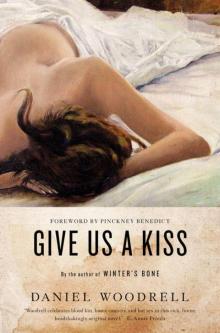 Give Us a Kiss: A Novel
Give Us a Kiss: A Novel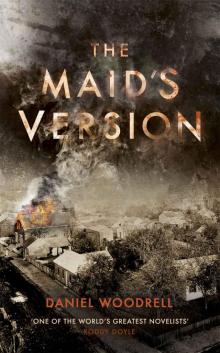 The Maid's Version
The Maid's Version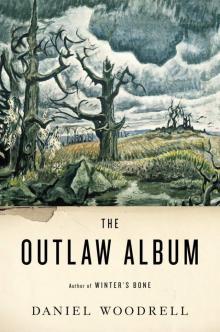 The Outlaw Album: Stories
The Outlaw Album: Stories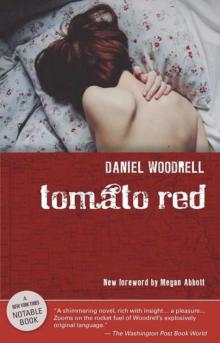 Tomato Red
Tomato Red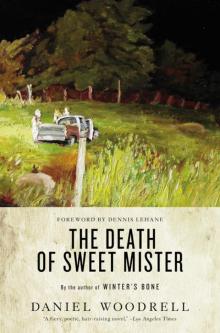 The Death of Sweet Mister
The Death of Sweet Mister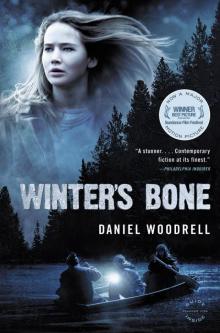 Winter's Bone
Winter's Bone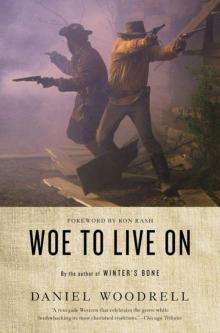 Woe to Live On: A Novel
Woe to Live On: A Novel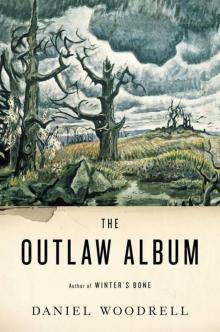 The Outlaw Album
The Outlaw Album